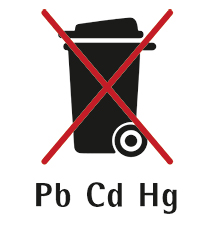Waste disposal and environmental regulations
References to the German Electrical and Electronic Law (ElektroG) and Battery Law (BattG)
Electrical and electronic appliances may not be disposed of as part of the household garbage. Consumers can drop off their used electrical appliances at no cost at one of the local collection points.The product contains batteries necessary for its use. The description of the batteries and their safe removal are described in the chapter Changing the batter-ies/maintenance.Used batteries may not be placed in the household garbage. Consumers are required to take the batteries to a suitable collection point at shops or their local community. They can also be returned after use to the place where they were bought at no cost.Used batteries may possibly contain harmful substances or heavy metals which can damage the environment and your health. Batteries can be recycled, they contain important raw materials like iron, zinc, manganese, and nickel.The symbol of a garbage bin with a line through it means:Used and rechargeable batteries may not be placed in the household garbage.The sign underneath the garbage bin stands for:Pb: battery contains more than 0.004 % leadCd: battery contains more than 0.002 % cadmiumHg: battery contains more than 0.0005 % mercury.
 |
The symbol with the crossed out refuse bin means: Batteries and rechargeable batteries may not be disposed of in the household rubbish. The symbols under the refuse bin stand for: Pb: Battery contains more than 0.004% lead Cd: Battery contains more than 0.002 % cadmium Hg: Battery contains more than 0.0005 % mercury |









